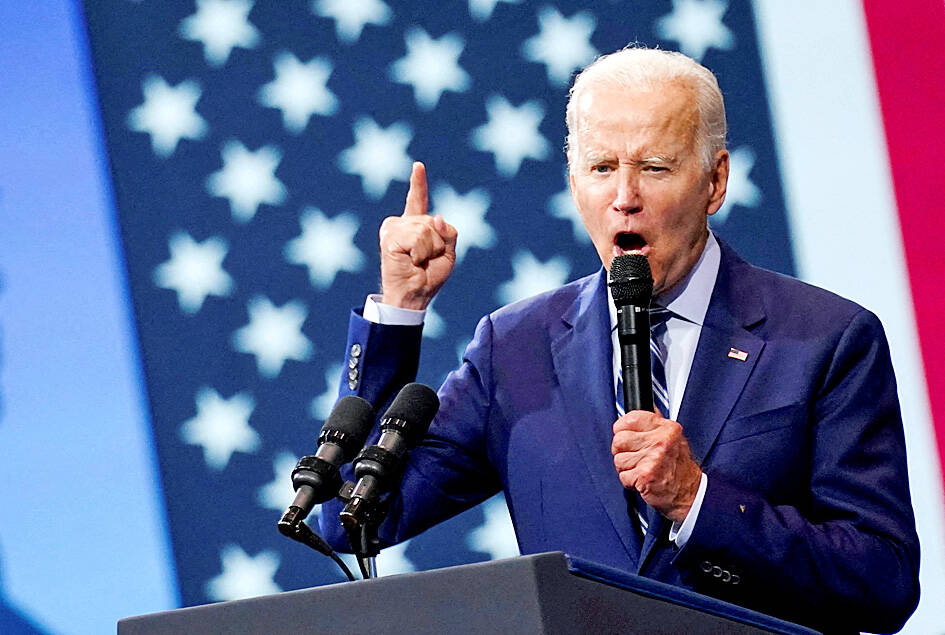The administration of US President Joe Biden is considering moves that would restrict US investment in Chinese technology companies amid growing tensions between the two countries, people familiar with the matter said on Friday.
The investment curbs taking shape would likely come as an executive order to be signed by Biden in the coming months, one of the people said.
A separate action against TikTok, a hugely popular video-sharing app owned by China’s ByteDance Ltd (字節跳動), is possible, but no action is imminent, the person added.

Photo: Reuters
The US Department of Commerce might place further restrictions on chips used for artificial intelligence computing, they said..
The White House is in discussions with the US Congress on legislation requiring companies to disclose planned investments in certain Chinese industries, the other person said.
Among options being discussed is the establishment of a system that would give the US government the authority to block investments outright, the second person said.
The executive order would be part of a broader strategy, they said, adding that the US recently curbed sales of semiconductors to China and Russia.
Last month, Biden signed into law a broad competition measure that includes about US$52 billion to bolster domestic semiconductor research and development.
The White House declined to comment on Friday.
TikTok representatives did not immediately respond to a request for comment.
The commerce department expects to by the end of the year have an update on steps to protect Americans’ data from foreign-owned apps, the department’s press office said earlier this week.
US companies are under increasing government scrutiny over what they sell to China, whose electronics factories and consumers make it the biggest buyer of chips.
Washington has been tightening restrictions on sales to the country, arguing that it represents a security risk.
Nvidia Corp shares tumbled on Thursday after the chipmaker said new rules on the export of some artificial intelligence chips could affect hundreds of millions of dollars in revenue.
The executive order might be intended to address some of the concerns contemplated in the draft “national critical capabilities defense act” introduced by US senators John Cornyn and Bob Casey, Biden administration sources said on condition of anonymity.
The US has up to now pursued a patchwork policy that has stopped short of flat-out locking Chinese firms out of the chip industry.
It has concentrated on singling out individual companies, such as Huawei Technologies Co (華為) and Semiconductor Manufacturing International Corp (中芯), that it has accused of being a threat to national security.
Both companies deny the allegations.
Recent steps indicate that the administration is leaning toward a more hawkish stance of banning Chinese access to whole swaths of technology, experts have said.

‘TAIWAN-FRIENDLY’: The last time the Web site fact sheet removed the lines on the US not supporting Taiwanese independence was during the Biden administration in 2022 The US Department of State has removed a statement on its Web site that it does not support Taiwanese independence, among changes that the Taiwanese government praised yesterday as supporting Taiwan. The Taiwan-US relations fact sheet, produced by the department’s Bureau of East Asian and Pacific Affairs, previously stated that the US opposes “any unilateral changes to the status quo from either side; we do not support Taiwan independence; and we expect cross-strait differences to be resolved by peaceful means.” In the updated version published on Thursday, the line stating that the US does not support Taiwanese independence had been removed. The updated

‘CORRECT IDENTIFICATION’: Beginning in May, Taiwanese married to Japanese can register their home country as Taiwan in their spouse’s family record, ‘Nikkei Asia’ said The government yesterday thanked Japan for revising rules that would allow Taiwanese nationals married to Japanese citizens to list their home country as “Taiwan” in the official family record database. At present, Taiwanese have to select “China.” Minister of Foreign Affairs Lin Chia-lung (林佳龍) said the new rule, set to be implemented in May, would now “correctly” identify Taiwanese in Japan and help protect their rights, the Ministry of Foreign Affairs said in a statement. The statement was released after Nikkei Asia reported the new policy earlier yesterday. The name and nationality of a non-Japanese person marrying a Japanese national is added to the

AT RISK: The council reiterated that people should seriously consider the necessity of visiting China, after Beijing passed 22 guidelines to punish ‘die-hard’ separatists The Mainland Affairs Council (MAC) has since Jan. 1 last year received 65 petitions regarding Taiwanese who were interrogated or detained in China, MAC Minister Chiu Chui-cheng (邱垂正) said yesterday. Fifty-two either went missing or had their personal freedoms restricted, with some put in criminal detention, while 13 were interrogated and temporarily detained, he said in a radio interview. On June 21 last year, China announced 22 guidelines to punish “die-hard Taiwanese independence separatists,” allowing Chinese courts to try people in absentia. The guidelines are uncivilized and inhumane, allowing Beijing to seize assets and issue the death penalty, with no regard for potential

‘UNITED FRONT’ FRONTS: Barring contact with Huaqiao and Jinan universities is needed to stop China targeting Taiwanese students, the education minister said Taiwan has blacklisted two Chinese universities from conducting academic exchange programs in the nation after reports that the institutes are arms of Beijing’s United Front Work Department, Minister of Education Cheng Ying-yao (鄭英耀) said in an exclusive interview with the Chinese-language Liberty Times (the Taipei Times’ sister paper) published yesterday. China’s Huaqiao University in Xiamen and Quanzhou, as well as Jinan University in Guangzhou, which have 600 and 1,500 Taiwanese on their rolls respectively, are under direct control of the Chinese government’s political warfare branch, Cheng said, citing reports by national security officials. A comprehensive ban on Taiwanese institutions collaborating or